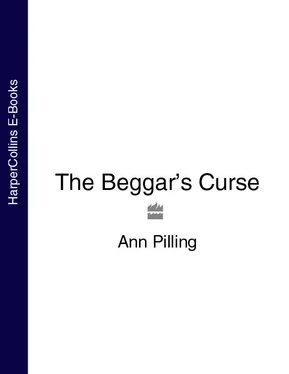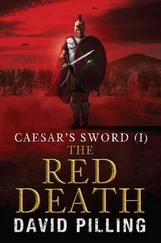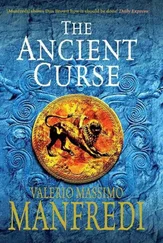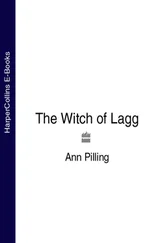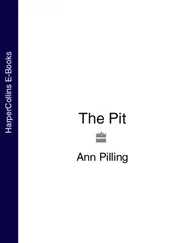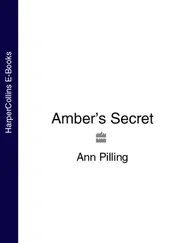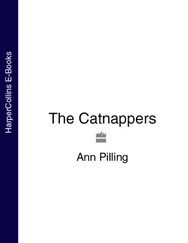“It’s ours,” said Colin.
“Oh, but – yours dear? This?”
“Well, yes; she wasn’t allowed to go to Scotland, you see, and you said. . .”
Molly Bover’s round moon face clouded slightly. She said nothing for a minute, but took refuge in the three young faces. She liked children. The two Blakemans looked alike, freckled and gingery with curly reddish hair and dark brown eyes. Prill was pretty, a good subject for a portrait. But Molly didn’t paint these days, she had to concentrate on making her pots, to bring a bit of money in. Next to his cousins poor Oliver looked a real shrimp. Colin was a head taller, broad-shouldered and powerful-looking. Oliver was pale-faced and spindly.
Molly thought he spent far too much on his own, shut away in that damp little flat with his mother always pumping pills into him. A week or so in the country would do him a power of good. . . Her reverie was shattered by a shaggy wet face being thrust under her nose, and by more mad barking. “ Jessie , of course, yes, I do remember now. Only there are the poodles. . . Oh well, let’s sort that out when we get home. Come on.”
They followed her out of the station towards an old blue estate car, Oliver carrying his tidy little case, Prill hanging on to the dog, Colin gloomily lugging a trolley with their old trunk on it. He had that sinking feeling. Molly Bover had obviously forgotten about Jessie and the dog wasn’t used to other animals. She’d eat Poodle One for dinner and Poodle Two for tea. It wasn’t a very promising start.
The minute the car door was opened all hell broke loose. Two toy poodles in the back hurled themselves against the battered dog guard in their effort to get at Jessie. She barked back, leaped on the nearest seat, and pushed her long nose through the bars.
“Jessie!” Colin yelled, yanking her outside. He could see the guard collapsing and the whole thing ending in a bloody free-for-all.
“Get in, get in, will you,” Molly said, vaguely alarmed. “I’ll put the cases in the back. Can she sit with you, do you think? It might be easier.”
Oliver settled himself by a window and the others clambered in after him. Jessie scrambled up on to the three pairs of knees and squirmed round trying to get herself comfortable. She liked being with people.
Oliver was almost suffocated. It had taken him all last summer to get used to this dog, and she’d obviously gone backwards in the last six months. The Blakemans just didn’t discipline her. And he didn’t like having the tail end either. He gave Jessie a sly shove and she moved over slightly, making herself into a miserable russet heap on Prill’s lap.
Colin thought Molly Bover was a bit odd-looking. Dad had told them she was over seventy, but in spite of the thick white hair straggling out of its untidy bun, she had a young face. She wore a dusty black cape with a hood lined in bright red. The hem was falling down and pinned up with a few safety pins. The artistic effect was further ruined by some mud-spattered wellington boots.
Uncle Stanley had warned them to expect bad weather up here, he’d advised rubber shoes, hats, gloves and hot water bottles. Oliver, who always wore three times as many clothes as anyone else, was obviously well-prepared.
The two black poodles were called Potty and Dotty and they yapped solidly all the way home. Colin and Prill grinned when they heard the names. It was hard to picture this sensible, no-nonsense Molly Bover yelling “Potty! Dotty!” down the village street. It was a long drive from Crewe across the flat Cheshire plain. The road threaded its way across a patchwork of small fields and went through villages of rather dreary houses. Now and then they saw a thatched cottage painted white, criss-crossed with old black timbers.
“Magpie architecture,” Oliver said importantly. “It’s in my book. They built the houses like that to make them more stable. The ground’s not always too firm, round here.”
Prill scowled at Colin. He was off . Why, oh why, did Grandma’s friend have to be in hospital now , just when the holidays started? She’d forgotten how irritating Oliver could be.
They kept seeing signs to Stang but there was no sign of a village. The car rattled down narrower and narrower lanes, then dived under a bridge. “There’s a canal above our heads,” Molly explained, slowing down so they could see properly. “It leaks a bit. When I was a child I used to stand here and imagine the whole thing collapsing. Anyway, we’d better get on. Not much further now.”
“But where is Stang?” said Prill. They’d emerged from the dripping bridge on to a perfectly flat piece of road. “It’s miles away, surely?”
“ Wrong ,” Molly answered mysteriously. “We’re nearly there. It’s in a valley, you see. You can never see Stang till you’re right on top of it. I expect your dad’s told you the old rhyme, Oliver?
‘The last man into Stang at night
Pulls down the lid and makes all hatches tight .’
He was always quoting that.”
Prill felt cold. It would be warmer down in the village, nicely tucked away in its little hollow. She was quite relieved that Stang wasn’t up on this plain where the wind could get at it, or near that gloomy canal. She stared through the window as Molly slowed down to let a tractor go by. Spring had hardly started here yet, though it was a very late Easter. The trees were only the faintest green. It was as if they were waiting for a warm spell, before hanging their flags out. For April the countryside was unusually quiet and still. Spring was well advanced at home, with trees in full blossom and birds busy everywhere. Round here, everything seemed to be still waiting.
Molly had switched her car engine off. A three-sided argument had developed between the tractor driver, a builder’s lorry, and a loud-mouthed youth on a red motorbike. “Sorry, folks,” she said cheerfully, opening her window. “A bit of local colour for you. That’s Tony Edge, our local Romeo.”
“A great big scrape,” the boy was bawling at the lorry driver. “Have to be resprayed that will.” Then they heard, “Come off it, mate, you did it on purpose. I know your sort.”
“Oh, he is ridiculous,” Molly muttered through her teeth. “As if the poor man meant to do it. Come on , Tony,” she shouted. “Move, will you. I’ve not got all day.” And she gave a sharp blast on the horn. At the sudden noise the young man jerked up his helmeted head and stared at the rusty old car ferociously. Colin was peering out of a side window, and their eyes met.
There was something rather awful about Tony Edge’s face, though he was certainly handsome, tanned, with bold, even features, large eyes, and a good strong nose, and he’d recently grown a splendid moustache. No wonder all the village girls wanted to go out with him.
But it was his eyes.
Colin tried to outstare them, but he couldn’t. Something in that face forced him to drop his gaze and he peered down into his own hands, feeling vaguely foolish, not really understanding what was going on. He was shivering slightly, and his flesh tingled as if he’d just had a small electric shock. That awful stare had made their cousin’s cool, calculating look seem quite ordinary.
He glanced at Oliver but all he could see was a narrow back. His cousin got dreadful car sickness. Perhaps he was taking this opportunity to vomit out of the window. Poor Oll.
But Oliver was doing no such thing. He wasn’t interested in a slanging match between a village lout and a man in a lorry. He’d seen something much more interesting, and he wanted to take a photo of it.
Oliver was often very secretive; he slid a small camera out of his pocket, pressed the “telephoto” button, and put it to his eye. His ignorant cousins would say it was only a sparrow, but Oliver thought that the small bird hopping in and out of the tangled hedge might be something much rarer. He breathed in, and clicked. It was the last film on the cartridge so he could get it developed quickly and sent off to his father. Just because they lived in London it didn’t mean he wasn’t interested in wildlife. He knew a lot more about birds than the Blakemans, anyway.
Читать дальше
